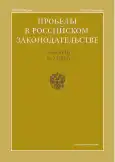Protection of State Secrets in Operational Investigative Activities: Modern Problems in the Context of Digitalization (Organizational and Historical-Legal Aspects)
- Authors: Maydykov A.A.1, Ogurtsov A.E.2, Konashenkov S.O.2
-
Affiliations:
- Academy of Management of the Ministry of Internal Affairs of Russia
- Vladimir Kikot Moscow University of the Ministry of Internal Affairs of Russia
- Issue: Vol 18, No 2 (2025)
- Pages: 122-131
- Section: Criminal Law Sciences
- URL: https://journal-vniispk.ru/2072-3164/article/view/290360
- EDN: https://elibrary.ru/RTMLWZ
- ID: 290360
Cite item
Abstract
This article examines modern challenges related to the protection of state secrets in the context of the digitalization of operational investigative activities (OIA) in the Russian Federation. Key issues are explored, including information leaks, cyberattacks, the use of anonymous networks and cryptocurrencies, as well as the shortage of qualified specialists in the field of cybersecurity. Legal and organizational measures aimed at adapting OIA to the challenges of the digital era are analyzed, including the implementation of big data technologies, artificial intelligence, and biometrics. Particular attention is paid to balancing the effectiveness of OIA and the protection of citizens' rights, as well as to the role of ethical hackers in ensuring information security. Examples of legal regulation and practices of cooperation with international organizations in the field of cybersecurity are provided.
The following objectives were achieved within the framework of the study:
— an analysis of modern threats to the protection of state secrets was conducted;
— key directions of OIA digitalization and the associated problems were identified;
— the effectiveness of implementing technologies and legislative initiatives to enhance information security was evaluated;
— recommendations were proposed for improving legal regulations and operational methods in the context of digitalization.
Keywords
Full Text
##article.viewOnOriginalSite##About the authors
Andrey A. Maydykov
Academy of Management of the Ministry of Internal Affairs of Russia
Author for correspondence.
Email: maydikov@mail.ru
SPIN-code: 9824-0017
Cand. Sci. (Law), Assoc. Prof., Associate Professor of the Department of Organization of Operational Investigative Activities
Russian Federation, MoscowAlexander E. Ogurtsov
Vladimir Kikot Moscow University of the Ministry of Internal Affairs of Russia
Email: a.ogurzov@yandex.ru
SPIN-code: 7264-4687
Cand. Sci. (Law), Assoc. Prof., Deputy Head of the Department of Organization of Operational Investigative Activities
Russian Federation, MoscowSergey O. Konashenkov
Vladimir Kikot Moscow University of the Ministry of Internal Affairs of Russia
Email: conashenkov.s@yandex.ru
SPIN-code: 8434-1066
student
Russian Federation, MoscowReferences
- Baranov V. V. Operational Investigative Activities in the Context of Digitalization: Problems and Solutions. Moscow: Legal Literature, 2021.
- Belyaev A. I. Protection of State Secrets: Legal Aspects. Saint Petersburg: Legal Center, 2022.
- Gatagonova R. M. Formation and Development of the Institution of State Secret Protection in Russia. Business in Law. 2010. No. 5. Pp. 116–118. (in Rus.).
- Bylinkina E. V Blockchain: Legal Regulation and Standardization. E. V. Bylinkina. Law and Politics. 2020. No. 9. Pp. 143–155. doi: 10.7256/2454-0706.2020.9.33614. (in Rus.).
- Gromov N. K. Digitalization and Security: Challenges for Security Agencies. Novosibirsk: Siberian University Publishing, 2020.
- Dyakov P. L. Operational Work in the Context of Digital Technologies. Kazan: Institute of Law, 2022.
- Egorov M. V. Legal Aspects of Protecting State Secrets. Yekaterinburg: Ural Federal University, 2021.
- Lagutenko I. P. (2022). Operational Investigative Activities in the Context of Globalization and Digitalization. Journal of Criminology. 3(12). Pp. 45–56.
- Lagutochkin A. V. Obtaining Computer Information: Theoretical and Practical Issues. Bulletin of the Academy of the Investigative Committee of the Russian Federation. 2023. No. 1 (35). Pp. 75–81. (in Rus.).
- Lagutochkin A. V. Essence, Formation, and Prospects for the Use of Neural Network Technologies in Operational Investigative Activities. Scientific Notes of the Crimean Federal University Named after V. I. Vernadsky. Legal Sciences. 2022. Vol. 8. No. 4. Pp. 354–365. (in Rus.).
- Aktsyzov D. S. Operational Investigative Activities of the Russian Federation in the Context of Digitalization. D. S. Aktsyzov, I. A. Shananin. Student. 2022. No. 15–6. p. 185. (in Rus.).
- Pogonyshev V. A. Issues of Digitalization of Operational Investigative Activities of Employees of the Ministry of Internal Affairs of Russia. V. A. Pogonyshev, T. M. Khvostenko, P. S. Kovalev. Bulletin of the Middle Russian University Educational Consortium. Information Technologies. 2021. No. 2 (18). Pp. 58–63. (in Rus.).
Supplementary files








